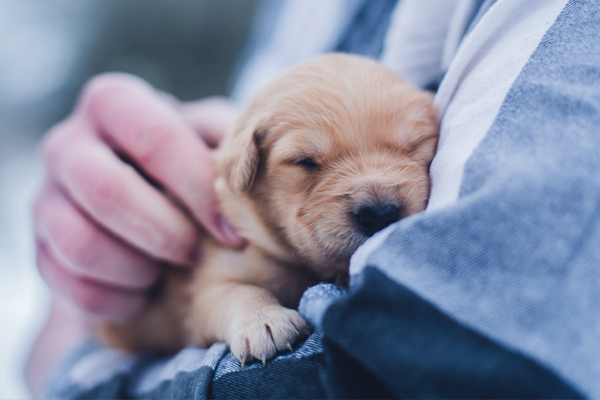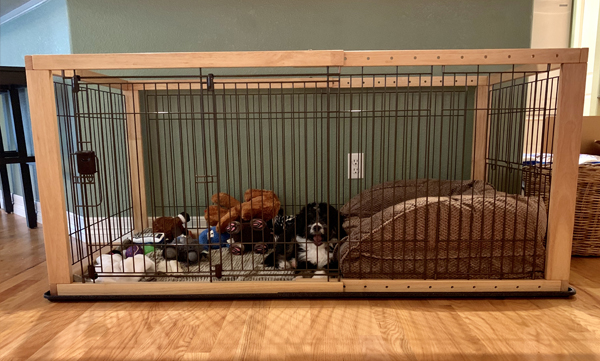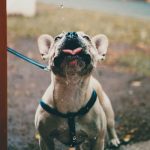
From a puppy’s point of view, puppyhood is a time of unapologetic energy, lots of exciting places to explore, new people and animals to meet, and tons of fun and adventurous times ahead. From a Puppy Parent’s viewpoint, it is a cute and cuddly time filled with this innocent and needy “baby” that craves lots of love and attention. However, it can also be a time of whining, howling, screaming, sleepless nights, sharp teeth, torn and chewed items, soiled floors, endless training, and constant puppy monitoring.
These are the differing perspectives as experienced by the new puppy and its puppy parent(s) that must congeal and become one with each other for the “man’s best friend” bond to eventually materialize. However, with consistent effort, a dedicated routine, ample training, lots of patience and a good dose of love sprinkled in, the initial separation of objectives between puppy and puppy parent will merge together and a lifelong, unbreakable partnership will develop.
The first few days and weeks after bringing a new puppy home is typically a wonderful and exciting time for both the puppy and the puppy’s new family. There is this new, soft, furry, cuddly, friendly, excitable and curious little creature running around at breakneck speed and discovering new things every day. However, many puppies begin missing their mom, littermates and the family that helped bring them into this world. It can often be a stressful time, but it does get much better and soon the initial disruption of routine, peace and quiet, and sleep, turns into an obedient dog, faithful companion and a member of the family you could never imagine not being around.
This Guide for First Time Puppy Parents will help with the transition from being puppy-less to welcoming a puppy into your home and family. You will find these tips very useful in making a puppy feel secure, being part of the “pack”, developing a safe place for your puppy, training, socialization, setting a routine, finding a spot to eliminate outside and becoming a valued member of the family.

Marshall, Mini Bernedoodle using Expandable Pet Crate
This is first on the list because it is the most important item to obtain before even bringing a puppy home. A crate is a “Good Thing” as Martha Stewart loves to say. And the right size crate or kennel is important. The crate should be only big enough to allow the puppy to stand up and turn around in. There shouldn’t be enough space that your puppy feels he can eliminate in a corner and still live in another area of the crate. Elimination shouldn’t take place in the crate unless you have to be away for many hours of the day and there is no choice but for the puppy to eliminate in his home. If this is the case you will need a larger crate. But, be prepared for your potty training to take longer if your puppy is allowed to eliminate easily in his crate. With the crate or kennel needing to be a small size to begin with, it’s best to find a crate with movable partitions so the crate can grow with the puppy. Otherwise, you will need several sized crates over the time the puppy is crated.
Pet Gates
If you don’t want your entire home to be accessible to your new puppy, a good Pet Gate is essential for defining the area where your puppy can roam. Pet gates come in many sizes, shapes, and materials, so it’s personal preference as to which gate(s) to purchase. Richell makes a unique, easy to operate with one hand gate called the One-Touch Metal Mesh Pet Gate which makes opening and closing much easier. You will want a pet gate to block off any stairs or areas where carpeting is located since messes are much harder to clean off carpet than tile or wood flooring.
Puppy Enclosure or Room
A Puppy Enclosure or a room that can contain your puppy when supervision isn’t possible or when you need a break can be very helpful. A bathroom, laundry room, mudroom or kitchen can double as a puppy room if it can be blocked off with a pet gate. Preferably it is an area that incorporates flooring that can be easily cleaned. You can place bedding in one area and a Potty Training Pad in another.
Bedroom DreamingThank you so much for sponsoring our Puppy Starter Bags. You have supplied us with enough puppy pads to cover all of our bags this year. We tested some out on the babies and I'm impressed! Super absorbent does the job for sure and keeps the puppies dry. Five stars from us and we are excited to include these in all of our bags 🙂 Thanks Richell from all of us here at LoneStar Malinois
Puppies are essentially babies with fur, so it can be comforting to them if you place their crate in your bedroom for the first few nights. Just be careful not to overdo it and let them think they will sleep in your room every night. The first few nights can be the most taxing, and it can help to have your puppy close at hand so you can reassure him from your bed instead of having to constantly get out of bed and go to where you have placed your puppy’s crate.
Daily Routine
A daily routine is critical for proper feeding, elimination and sleeping. The closer you can follow this routine each day, the easier it will be to properly train your new pooch. If everyone in the household is on the same page and understands what to do, and what not to do, with the new puppy, training will go much easier, and the entire family will reap the benefits much quicker.
Potty Place
A dog’s sense of smell is over 10,000 times greater than ours. If an outdoor potty spot is determined early on, your puppy will gravitate toward that one spot each time they need to eliminate and it will make potty time much easier for all involved. And when they go to that one spot and sniff around, the scents from previous trips will encourage them to eliminate quicker and more easily. The number of hours a puppy can hold their bladder is typically their age in months, plus one. So, a 3-month-old puppy can generally “hold it” for 4 hours. At night when they haven’t had anything to drink for a while before bedtime and if they are let out to “go” right before going to bed, they can last longer.
Play, Play, Play
A great way to become closer to your new puppy is to play with it a lot. Fetching games teach your new pup to retrieve items and bring them back to you. Chew toys encourage chewing on appropriate items versus carpet, furniture or hazardous items. Healthy puppy treats are great for teaching your new family member to sit and stay – important commands so they remain safe and don’t jump on guests.
Puppy Training
Puppies must be trained so they become well behaved and helpful family members. Some training such as walking properly on leash, retrieving, sit and stay can be done at home, but enrolling your pup in a training class will allow for socialization with other puppies and help him learn commands that are easier learned in a group setting. Just remember that your puppy is a baby and he won’t perform a perfect sit, stay or heel right away. The primary focus should be on socialization and making sure that your pup is having a good time.
No Jumping
From the start, there should be no jumping up on people, cabinets, etc. If this bad habit is eliminated right away as a puppy, it will be much easier to curb in the future as your puppy grows into a juvenile and then an adult.
Reward Good Behavior
Rewarding good behavior is much easier and effective than scolding bad behavior. If a reward system is established early on for good behavior it will make training so much easier moving forward.
Pick Up EVERYTHING
Be sure to pick up anything and everything that you don’t want to be destroyed. Puppy proofing a home can take some time and experience but realizing that anything within a foot or two of the ground is easy pickings for a puppy. It also helps to get down on all fours and move about your home as if you were a puppy. Seeing things from this vantage point will help you remove any and all items that could fall prey to sharp puppy teeth.
Chewing
Chewing comes naturally to puppies and dogs. It’s good for their teeth and oral health. Providing appropriate sized chew toys and bones for the puppy stage and beyond is critical to a well-behaved and healthy canine.
Socialization
Letting your puppy meet new people each week is a great way to help with his socialization skills. He will be less aggressive and more accepting of everyone in the long run. Hold off on socializing with other animals outside of family pets until he has received all of his puppy shots. This includes abstaining from dog parks for the first few months. Once he has received all of his shots, socializing your puppy with other pups and animals is a great way to enhance their socialization skills.
Handle and Groom Often
The more a puppy is handled, the more used to people it will become, and the more it will become acclimated to the human “pack”. Dogs are pack animals and your puppy will be looking to establish who the “Alpha” is in the pack. Ideally, that should be the adult who is able to be around and take care of the puppy the most. It is also good to groom your puppy as often as possible. This will increase handling time, keep them tangle-free and help keep fur cleanup to a minimum. Your puppy should also begin to realize through increased handling and interaction that all humans are higher in the social order than the animals in the household. This helps with keeping interactions safer between growing dogs and small children.
Pre-visit your Vet
Vet visits can be intimidating to some puppies. For others, it is no big deal. But visiting your vet prior to going in for shots, a checkup or medical care will go a long way toward preparing your puppy for the veterinary office prior to the time when he needs to go for real.
Eliminate Odors
Be sure to clean up any indoor accidents as quickly as possible. Having such a keen sense of smell, puppies will gravitate to the same spot to eliminate or defecate again and again when the urge hits. Using a solution like Nature’s Miracle, which utilizes an enzyme-based formulation to eliminate pet odors, will help a lot. You can also use a 50/50 mixture of vinegar and water. The key to cleaning up an accident on the carpet is to first dab the spot as dry as possible with paper towels. Step on the towels if needed to draw up as much moisture as possible. Then spray on the vinegar mixture and let it sit for ten minutes. Next, blot the spot dry with more paper towels. Once the spot is dry you can sprinkle on baking soda and let it sit for 15 minutes. Then vacuum it up. This process will eliminate the vast majority of the odors and hopefully keep your puppy from revisiting the same spot again.
TV, Radio, Computer
To relax your puppy anytime, but especially if you need to step out for a bit, put on the TV, radio or play something from your computer to soothe your pup and let him think someone is still there with him. You will be amazed at how well this works most of the time.
Take Pictures and Video
Puppies don’t stay puppies very long. They grow really quickly, and before you can blink they are nearly full grown. Remember to snap pictures and take videos as often as possible, especially during the first 6 months when they are growing each and every day.
Bringing home a new puppy is fun, exciting and rewarding. But, it can also be a challenge during the first few days, weeks or months. The guide tips above should help in the process of transforming your new addition into a healthy, well behaved and friendly addition to the family. Puppyhood is cute and cuddly…but short. Be sure to incorporate as many of the suggestions above as possible and don’t forget to fully document your journey whenever possible.
 Canine Hydration – The Importance of Adequate Water in a Dog’s Diet
Canine Hydration – The Importance of Adequate Water in a Dog’s Diet
02.07.2020
It is a well-known fact that water (H2O) is critical for the survival of all living creatures. For the vast majority of us, water makes up 70 - 80% of our being. It is the primary component for all healthy cells, and we just can’t last long without it. Humans can go up to 3 weeks without food, but only about a week in mild conditions without water. >>> READ MORE
12.27.2019
Pets enjoy an adventure as much as we do. They are almost always up for a fun trip, especially if it is with their Alpha or to a place they haven’t yet been to. The key is to engage their interests and do it safely. Traveling with pets can definitely be an enjoyable experience... >>> READ MORE
 The Importance of Animal Shelters
The Importance of Animal Shelters
11.25.2019
They are ever-present by our side through good times and bad. Always at the ready, loyal, compassionate, undeterred and dutifully mindful of their job to comfort and protect their human family. >>> READ MORE
Please complete this form and click "Submit". Our Customer Support team will gladly address your request and respond in a timely manner.
Richell USA, Inc.
Copyright © Richell, Inc.. All rights reserved